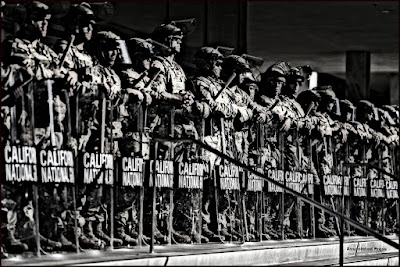Along party lines, and as per usual,
Republicans and Democrats are pretty evenly divided between yays and nays at
about eighty-odd percent of Republicans “for”, and eighty-odd percent of Democrats
against. But where the rubber meets the road is in the middle of majority sentiments.
Independents smash the two-party tie with a full sixty percent opposed. In
total, fifty-six percent of Americans apparently disapprove of Trump’s actions.
Worse still for the MAGA camp, only thirty-eight percent of Independents trust
Trump to make appropriate decisions in dealing with Iran in the future.
That said, there are both clearly plausible
logic and firmly based facts on either side of the argument. The first, in
favor of Trump’s clearly uncounseled action, is that nobody with any
sense wants to see Iran, under its current leadership, get its hands on nuclear
weapons. It is a radical theocracy known as the world’s greatest supporter and
exponent of international terrorism. At the core of its radicalism is the idea
that “infidels” are free game and that Western democracy is an axis of evil
that should be destroyed.
In that sense, there is a great deal of logic in taking steps to dismantle and/or destroy the current Iranian regime’s nuclear capabilities. But before we cheer for President Trump, it is worth pointing out that diplomacy had already gone a long way toward not only curtailing the advancement of Iran toward becoming a nuclear threat, but also toward becoming a less hostile and more integrated member of the concert of nations. President Barack Obama and America’s Western allies successfully negotiated a nuclear deal with Iran that went a long way toward ensuring that it became trustworthy in terms of making only peaceful use of its nuclear capabilities.
With one fell swoop of his Sharpie,
Trump, in 2018, arbitrarily trashed the aptly named Joint Comprehensive Plan of
Action (JCPOA)—e.g., the Iran nuclear deal— in a reckless move that not only
left US allies stunned and confounded, but that also caused Iran to immediately
go back on the promises it made in that accord and to start intensifying, even
more than before, its development of a path to nuclear weaponry. In other
words, it is largely the fault of Trump’s actions during his first term in
office that we have reached this juncture with Iran in the first place. This is
typical of Trump’s ham-handed approach to diplomacy, such as it is, which
relies more on threats, insults, bullying and humiliation than it does
negotiation and compromise. This seems ironic, since Trump has long considered
himself a consummate negotiator and deal-maker. Truth be told, at least in his governance
techniques, there is precious little evidence of this alleged skill.
But putting that aside, there are
factual reasons on which supporters of
last weekend’s airstrike can hang their argument. Some of these include the
following:
Ø Experts
seem to agree that the airstrikes have substantially delayed—though not
definitively detained—Iranian nuclear development. It is worthwhile noting that
Iran’s original efforts toward obtaining a military nuclear device were largely
in response to Israel’s nuclear arms development, which extensively predates
Iran’s program. Israel began nuclear weapons development already in the 1950s,
shortly after becoming a country, and it is thought to have had a deliverable
nuclear device already in 1966 or 1967, while Iran still does not have a
nuclear arsenal.
Ø For better or for worse, Trump’s move, in
concert with the bombing raids already being carried out by Israel, sends an
unequivocal message that the current US administration is willing to use
military force in order to curtail nuclear arms proliferation, be it Iran or
any other nation entertaining the idea of becoming a nuclear power—something very
likely making other bad actors like North Korea sit up and take notice.
Ø The
preemptive move against Iran’s nuclear arms program could strengthen US ties
with allies like Israel, Saudi Arabia and the Gulf States that have been
watching Iran’s nuclear development with understandable concern. None of them
wants a nuclear-armed Iran.
Ø The
at least temporary destruction of its nuclear arms program is bound to limit
Iran’s regional influence and to undermine its leverage in any future
diplomatic negotiations.
Ø The
airstrikes may have a broader effect on Iran’s military-industrial capabilities
as a whole, making it less of an aggressive, belligerent presence throughout
the region.
Ø Principally,
the strikes will undoubtedly put hobbles on Iran’s ability to produce
weapons-grade fissile materials. Those strikes have thus achieved the non-proliferation
goals of the US, at least in the short term. According to David Albright, a
former UN weapons inspector, whether the mission was a complete success in
wiping out Iran’s ability to reach its nuclear arms goals is debatable. But its
facilities sustained at least very significant damage. Albright calculates that
if indeed Iran manages somehow to recover from the strikes, it will take it “at
least a year or two” to retool and reinitiate its nuclear arms development.
Ø As
Albright indicates, backed up by prior US intelligence community assessments
and reports, the airstrikes will, in all likelihood, only manage to delay, not
halt, Iran’s advancement toward its nuclear arms goals. This is especially true
considering that intelligence reports suggest that the Iranian government
managed to load up at least part of its already substantially enriched uranium
supplies and to move them to an unknown location. That means that if Iran can manage
to quickly rebuild its nuclear infrastructure, in some more secretive or
hardened location, it could continue the enrichment process from an already
advanced stage. It could, therefore, have a nuclear device within a relatively
short time span. And the US bombings, in support of Israel, with weapons never before
used in war, could give the Iranian regime a very real incentive to do so.
Ø The
unprecedently aggressive move by the Trump administration provides Iran with
the incentive to further deepen its ties with, and to seek the cooperation of other potential
US enemies. The two that stand out, while not the only ones, are North Korea
and Russia. Iran and North Korea maintain strategic ties, characterized by a
history of cooperation in areas like arms deals and missile technology, and they
are united by a shared opposition to US influence in their regions and the
world. The US has designated both nations to be sponsors of international
terrorism, a fact that aligns them philosophically and materially against US foreign
policies. Russia, meanwhile, is indebted to both the Iranian and North Korean
regimes. Both have provided substantial military aid to Vladimir Putin in his
war of aggression on Ukraine, and, in the case of Iran, in its other war of
aggression against the people of Syria, and in favor of the bloody regime of
former pro-Russian dictator Bashar al-Assad that oppressed them. Russia
and North Korea are both technically and politically capable of providing Iran
with help in reaching its aggressive nuclear goals sooner rather than later.
Ø Finally,
there is the inherent threat of direct Iranian retaliation. Indeed, Iran has
made it clear that it plans to take revenge. Considering that the current Iranian
regime is one of the world’s most dangerous purveyors of anti-American and
anti-Western terrorism, since the bombings the US has potentially become a
considerably more dangerous place, as has international travel and residence for
Americans in certain parts of the world. Furthermore, US military and embassy personnel
in the region surrounding Iran and within reach of its missiles and drones have
been placed at considerably higher risk than before the airstrikes were carried
out. There is also greater incentive for Iran to heighten its backing for
international terror groups such as Hezbollah and Hamas. All of these things
create more fertile terrain for expanding instability in the Middle East, and
for the eventual need for US boots on the ground. Trump’s aggressive action has
singlehandedly created those conditions, despite the fact that Americans as a
whole, and even a core of MAGA Republicans have no appetite for another
protracted war in the Middle East. There is also concern that any retaliatory action
by Iran to hamper shipping in the Strat of Hormuz could send oil (and thus fuel)
prices skyrocketing, a factor which would have a significantly negative effect
on both the US and global economies.
Beyond all of these considerations,
there are domestic and, as usual under Trump’s governance, constitutional
issues that are of no small concern. Trump has once again placed at risk the
system of checks and balances that protects and upholds US representative
democracy. To begin with, under the US
Constitution (Article I, Section 8), only Congress has the power to declare war.
Unilateral military action without congressional approval circumvents this
constitutional check.
Trump’s move also is in apparent
violation of the 1973 War Powers Resolution. Although this piece of legislation
provides presidents with a sixty-day window in which to take limited military
actions without congressional intervention, that authorization is necessarily
subject to prior notification of Congress at least forty-eight hours in advance
of any such action.
Trump apparently provided an informal
heads-up to legislators from his own party—a message that at least one
Republican described as “cryptic”—but failed to give any notification at all to
Democratic members of Congress. Under these conditions, last weekend’s
preemptive strikes were in apparent violation of this legal constraint intended
to maintain the balance of power between co-equal branches of government.
The unilateral and un-consulted way in
which the president ordered the strikes has further advanced Trump’s attack on
co-equal governance and bolstered his campaign to vastly expand authoritarian executive
power, by effectively weakening Congress’s constitutional ability to oversee
executive actions and its influence on foreign policy and the employment of the
country’s armed forces.
His action has also undermined principles
of co-governance with the third branch of government by completely bypassing
judicial review. If the courts are unable—or unwilling, due to pressure from a
Department of Justice that, under Trump, has lost all independence—to review
such actions because of executive invocation of the so-called “political
question” doctrine or of “national security privilege”, this then limits the
judiciary’s role in checking unconstitutional or otherwise illegal uses of
force.
In short, conducting such military
strikes without full transparency or consultation reduces interbranch
deliberation and public accountability, while centralizing all authority in the
executive. This is behavior typical of authoritarian regimes and has no place
in US representative democracy.
All things considered, we are witnessing
a disproportionate shift of power to the Executive Branch, one that
significantly weakens the Constitution’s intended purpose of creating a system
of inviolable checks and balances. Unfortunately, by handing the president
congressional and judicial powers on a silver platter, the Republican majority
in Congress is complicit in the relative success that Donald Trump is having in
his bid to turn the US into an oligarchic authoritarian regime.








